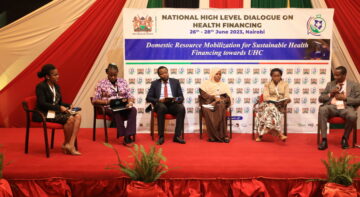Blogs

Early this year in February, a Cochrane entity was established in Kenya, making it the 4th country in Africa to have a Cochrane affiliate. Cochrane is a global independent network that gathers and summarizes the best evidence from research to enhance health knowledge and decision-making. The establishment of Cochrane Kenya is a timely and crucial step towards scaling up the availability of relevant, reliable and up-to-date evidence to inform health care interventions and improve Kenya’s health sector.
Officially launched during the 11th KEMRI Annual Scientific and Health (KASH) Conference held on 8-10 June 2021, Cochrane Kenya aims to promote evidence-informed healthcare decision-making by producing and disseminating high-quality, relevant and accessible synthesized research evidence.
Further, Cochrane Kenya will support the translation of research into policy and practice as well as build capacity for conducting and using systematic reviews among researchers, health professionals and decision-makers in Kenya and the East African region. The entity aims to become the leading advocate for evidence-informed health care in the country and beyond.
Nested within the Kenya Medical Research Institute (KEMRI), Resource Development and Knowledge Management (KM) Department, Cochrane Kenya is currently under the leadership of Chief Research Officer, Prof. Jennifer Orwa.
The launch of Cochrane Kenya Chapter as a knowledge translation platform has been acknowledged as a testimony of networking prowess of scientists in the country as highlighted by KEMRI Ag. Director General, Prof. Sam Kariuki. He notes that, “Cochrane Kenya is a platform that is geared towards improving health by ensuring that decisions about health and health care are informed by high quality, relevant and up-to-date synthesized research evidence.”
During the opening of the KASH conference, chief guest – Dr. Mercy Mwangangi, Chief Administrative Secretary (CAS) – Ministry of Health praised the establishment of Cochrane Kenya highlighting its potential to promote health science dialogue and exchange among scientists, health practitioners, development partners and policymakers for evidence-based decision-making and policy formulations.
She said, “Cochrane Kenya is a knowledge translation platform that promotes evidence-informed decision-making in health by producing high quality, relevant, accessible systematic reviews and other synthesized research evidence, and its launch in Kenya is a big boost to health research in the country.”
Cochrane Kenya has been established under the umbrella of Cochrane Africa, a network with a vision to increase the use of best evidence to inform healthcare decision-making in sub-Saharan Africa. As the fourth affiliate in Africa, Cochrane Kenya comes after South Africa, Nigeria and Cameroon. Cochrane South Africa was the first to be established under current leadership of Prof. Charles Wiysonge. It is through Cochrane South Africa that Cochrane Africa was established and launched at the Global Evidence Summit in Cape Town in September 2017.
Expressing enthusiasm, Cochrane Africa Deputy Director, Dr. Tamara Kredo said that, “we look forward to continued collaboration with the new leadership to enhance advocacy and increase access to Cochrane evidence in the country and to working with our many colleagues to strengthen Kenyan Cochrane activities in the years ahead.”
Establishment of Cochrane Kenya, a long time journey
Researchers in Kenya have a long history of leading research, policy development and clinical guidelines in the region. To date, there are about 44 Cochrane authors in Kenya as recorded in Archie (an internet-based repository containing information about contributors to Cochrane and all the documents and reviews produced. Within Archie it is possible for authors, editors and others to read, print and compare current and past versions of Cochrane protocols, reviews and other documents.
Given the many Cochrane contributors in Kenya, the timing was excellent for a geographic entity to be established to promote Cochrane activities in the country and potentially in the East African region.
Further, demonstrating the need for a Cochrane affiliate in Kenya recently were insights, participation and keen interest from attendees during a training held between 24-28 August 2020 on systematic reviews and meta-analyses. The workshop targeted staff from KEMRI and the Ministry of health (MoH), Division of research and innovation within the Directorate of Health Policy and Research Development, Health Information, Monitoring and Evaluation.
The over 150 participants were keen to understand the various elements involved in systematic reviews and how one can undertake a systematic review. To enable hands on practice on the knowledge obtained, a 6-month mentorship was offered following the training. For a successful mentorship programme, there has been need to bring together Cochrane beneficiaries in Kenya to assist with the mentorship.
The five-day virtual training was organized by AFIDEP in partnership with the Ministry of health (MoH) and KEMRI, through the Heightening Institutional Capacity for Health Research (HIGH-Res) Project.
It is worth to note that the HIGH-Res project has contributed to the establishment of Cochrane Kenya through its activities with the KEMRI Knowledge Management Unit, involvement in strategy development for Cochrane Kenya as well as in the planning of the formal launch of Cochrane.
Potential for national and regional impact
It is envisaged that with time, Cochrane Kenya will expand to offer both national and regional support and assist to:
- Promote evidence-based health-care practice and policy in Kenya including translation of research into policy and practice;
- Promote access and equity in the county’s health development agenda in research design to provide and promote policy context specific interventions that promote universal health coverage;
- Strengthen capacity for conducting and using systematic reviews among researchers, healthcare professionals and health decision-makers in Kenya and East Africa Community; and
- Over and above Cochrane Kenya will lead in advocating for evidence-informed healthcare in the country and the region.
Watch video of official launch:
Related Posts





